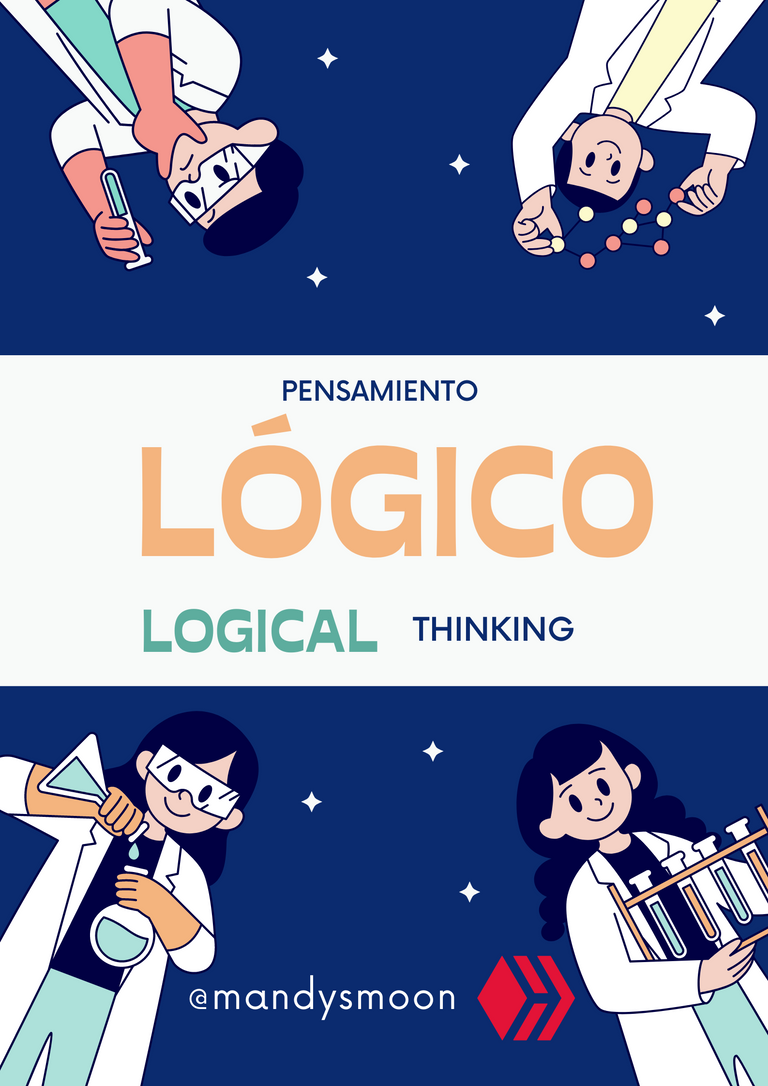Hi, dear Hive users!✨
¡Hola, queridos usuarios de Hive!✨

Español
(Scroll down for english)
Hoy estoy por acá para hablarles sobre un tema bastante interesante y que tiene tela que cortar por lo denso y extenso que puede ser, a pesar de ser algo cotidiano, común, hablado por muchos en muchas ocasiones y aplicado en casi todo momento. El razonamiento lógico✨.
Quisiera hacer una pequeña pregunta retórica: ¿sabes lo que es el pensamiento lógico? Pues estoy segura que sí. Sin embargo como para casi todo en esta vida existen diferentes definiciones de una misma cosa, por eso y para tener una idea más clara te presentaré una definición según Jaramillo Naranjo y Puga Peña (2016):
"El razonamiento lógico es una herramienta fundamental para la resolución de problemas de la vida diaria, ya que a través del mismo los individuos analizan, argumentan, clasifican, justifican y prueban hipótesis... Es importante relacionar con el pensamiento creativo, el mismo que posee varias características y atributos relevantes que reforzarán el análisis, la síntesis, argumentos de saberes y abstracción de conclusiones de textos en forma fácil y oportuna" (pp. 9)
Jaramillo Naranjo & Puga Peña (2016) El pensamiento lógico-abstracto como sustento para potenciar los procesos cognitivos en la educación

Teniendo esa definición entonces pudiéramos decir que se trata buscar y definir la lógica en las diferentes circunstancias. ¿Pero qué es la lógica? Se trata de analizar un conjunto de premisas y la relación entre sus consecuencias para encontrar una conclusión dada por un argumento válido...
Esto puede ser un tanto confuso, así que sin muchos tecnicismos, la lógica o el pensamiento lógico como tal es analizar un determinado tema, descartar cada característica y ver cómo se desarrolla o cómo actúa y qué consecuencias tiene. De allí para poder explicarlo se tiene que dar un argumento que sea coherente con lo observado. Eso es pensar con lógica. Es deducir, atar cabos sueltos para explicar el todo.
Se aplica en lo académico, lo científico e incluso lo cotidiano, para darle explicación a cosas a simple vista simples.
Me gusta explicarlo también con el arte: imagina un cuadro. Por poner un ejemplo común que seguramente has visto, imagina los girasoles de Van Gogh. ¿Cómo logró Vincent hacer ese cuadro? Pues la lógica indica que para hacerlo tuvo que en primer lugar tener todos los materiales artísticos para poder pintar: pinceles, brochas, caballete, lienzo, pinturas, paleta, etc. Evidentemente él sabía cómo utilizar cada material, así que procedió a aplicar sus conocimientos y pintar determinado tiempo hasta que logró ese resultado.
Observando puedo ver las diferentes características de lo que deseo analizar para así llegar a una conclusión, ésta resulta válida porque es evidente en el resultado final, es decir, lo observable. Por tanto, es lógica.
Pero dirás, ¿eso no es más sentido común? Pues ciertamente se asemejan, sin embargo, el sentido común es un tanto más intuitivo, desordenado y no requiere de un análisis a profundidad. En palabras coloquiales, no se piensa mucho. En cambio, en en razonamiento lógico se es más exacto y relacional, organizado, deductivo y principalmente demostrable.
Creo que de las características principales de la lógica es que se basa en los hechos. Es algo plenamente observable, constatable. En cambio en ocasiones el sentido común no es necesariamente comprobable sino mas bien un concepto social o cultural. Un ejemplo que se me ocurre es como cuando ves a un bebé vestido de rosa. El sentido común te dice que si lleva ese color es una niña, pero esto no es necesariamente así y llegar a esa conclusión no tiene otro fundamento que no sea un estereotipo social.

Entonces... ¿Somos lógicos o ilógicos? Pues creo que en determinados momentos de nuestras vidas somos uno y el otro. En las circunstancias necesarias utilizamos nuestro razonamiento lógico para solucionar un problema. Para hacer la comprensión un tanto más fácil usé ejemplos cotidianos, pero la verdad usamos la lógica tanto en esas ocasiones así como para solventar o comprender problemas más complejos como en lo académico e intelectual, donde se requiere procesar una mayor cantidad de información quizá compleja.
Por otro lado, en problemáticas quizá no tan complicadas basta con seguir nuestra intuición y aplicar conocimientos que hemos aprendido en la vida. Finalmente somos seres sociales y por mucho que nos esforcemos por ser lógicos y calculadores, seguimos siendo humanos que nos dejáremos llevar por el instinto no tan racional (o nada). Seguiremos aquellos patrones que aprendimos desde pequeños en el lugar donde vivimos.
Por tanto no debemos cuestionarnos como Hamlet entre si somos o no lógicos, en realidad somos ambas cosas. Sin embargo, al ser el razonamiento lógico más complejo no está mal ponerlo en práctica más seguido, para así ejercitar nuestros procesos cognitivos y por tanto tener una capacidad intelectual más amplia que nos permita comprender en general de manera más sencilla.
English
Today I am here to talk with you about a very interesting topic and one that has to be deconstructed because of how dense and extensive it can be, despite being something from day to day, common, talked about by many on many occasions and applied almost at all times. The logical reasoning ✨.
I would like to ask a small rhetorical question: do you know what logical thinking is? Well I'm sure you do. However, as for almost everything in life there are different definitions of the same thing, for this reason and to have a clearer idea I will present a definition according to Jaramillo Naranjo and Puga Peña (2016):
"Logical reasoning is a fundamental tool for solving problems of daily life, since through it individuals analyze, argue, classify, justify and test hypotheses... It is important to relate it to creative thinking, the same that contributes with several relevant characteristics and attributes that will reinforce the analysis, synthesis, arguments of knowledge and abstraction of conclusions from texts in an easy and timely manner" (pp. 9)
Jaramillo Naranjo & Puga Peña (2016) Logical-abstract thought as support to enhance cognitive processes in education

Having that definition then we could say that it is a matter of seeking and defining the logic in different circumstances. But what is logic? It is analyzing a set of premises and the relationship between its consequences to find a conclusion given by a valid argument...
This can be a bit confusing so without much technicality, logic or logical thinking as such is looking at a certain issue, discarding each feature and seeing how it plays out or how it acts and what consequences it has. From there, in order to explain it an argument must be given that is coherent with what has been observed. That is thinking logically. It is deducing, tying loose ends to explain the whole.
It is applied in the academic, the scientific and even the daily to give an explanation to simple things at first sight.
I also like to explain it with art: imagine a painting. To give a common example that you have surely seen, imagine Van Gogh's sunflowers. How did Vincent manage to make that painting? Well, logic indicates that to do so, he first had to have all the artistic materials to be able to paint: brushes, easel, canvas, paint, palette, etc. Obviously he knew how to use each material, so he proceeded to apply his knowledge and paint for a certain time until he achieved that result.
Observing it I can see the different characteristics of what I want to analyze in order to reach a conclusion, this is valid because it is evident in the final result, that is, the observable. Therefore, it is logical.
But you will say, isn't that more common sense? Well, they are certainly similar, however, common sense is somewhat more intuitive, messy and does not require in-depth analysis. In colloquial words, you don't think much. On the other hand, in logical reasoning it is more exact and relational, organized, deductive and mainly demonstrable.
I think one of the main characteristics of logic is that it is based on facts. It is something fully observable, verifiable. On the other hand, sometimes common sense is not necessarily verifiable but rather a social or cultural concept. An example that occurs to me is like when you see a baby dressed in pink. Common sense tells you that if the baby wears that color she is a girl, but this is not necessarily so and reaching that conclusion has no other foundation than a social stereotype.

So... Are we logical or illogical? Well, I think that at certain moments in our lives we are one and the other. In the necessary circumstances we use our logical reasoning to solve a problem. To make understanding a bit easier I used everyday examples, but the truth is that we use logic both on those occasions and to solve or understand more complex problems such as academics and intellectually, where it is required to process a greater amount of perhaps complex information.
On the other hand, in problems that are perhaps not so complicated, it is enough to follow our intuition and apply knowledge that we have learned in life. Finally, we are social beings and no matter how hard we try to be logical and calculating, we are still humans who will let ourselves be carried away by instinct that is not so rational (or not at all). We will follow those patterns that we learned from childhood in the place where we lived.
Therefore we should not question ourselves, like Hamlet, whether or not we are logical, in reality we are both. However, since logical reasoning is more complex, it is not bad to put it into practice more often, in order to exercise our cognitive processes and therefore have a broader intellectual capacity that allows us to understand in general more easily.
Instagram: @mandismoon
